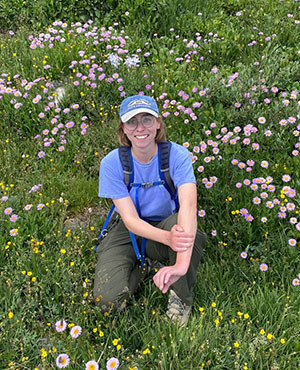
Contact Us
Institutional Communications
Bureau of Mines Building, Room 137
Laramie, WY 82071
Phone: (307) 766-2929
Email: cbaldwin@uwyo.edu
UW Graduate Student Honored for Research on Insects and Wind Turbines
Published November 17, 2023

Michelle Weschler
A recent University of Wyoming graduate student has received the 2023 Graduate Student Award for the Great Plains Cooperative Ecosystem Studies Unit (CESU).
Michelle Weschler, of Orlando, Fla., who completed her UW master’s degree in zoology and physiology earlier this year, was honored for her work in investigating and reporting interactions between insects and wind turbines.
Her project was funded through a Great Plains CESU agreement between UW and the U.S. Fish and Wildlife Service. CESUs are a result of cooperative agreements between federal agencies and universities, and this award was selected among graduate students from multiple states.
“Michelle’s thesis is a novel compilation of information estimating interactions between insects and wind turbines,” says Lusha Tronstad, lead invertebrate zoologist with UW’s Wyoming Natural Diversity Database who served as Weschler’s graduate adviser. “Only a handful of studies have addressed this topic directly, and Michelle’s work represents the most complete information on the subject.”
Interactions between vertebrate wildlife and wind turbines are well known; however, almost nothing is known about insects at these locations. Weschler’s project -- “Wind Energy and Insects: Reviewing the State of Knowledge and Identifying Potential Interaction” -- resulted in a master’s thesis that compiled knowledge about these interactions and identified knowledge gaps. The work is important as wind power grows rapidly across the globe, Tronstad says.
Among Weschler’s findings are that wind turbine placement, coloration, shape, heat output and lighting likely attract insects; insects that fly at elevations within the diameter of turbine rotors are more likely to strike turbines, which can decrease the turbines’ energy output; and insects attract insectivorous animals, which may be killed by the turbines.
Contact Us
Institutional Communications
Bureau of Mines Building, Room 137
Laramie, WY 82071
Phone: (307) 766-2929
Email: cbaldwin@uwyo.edu
